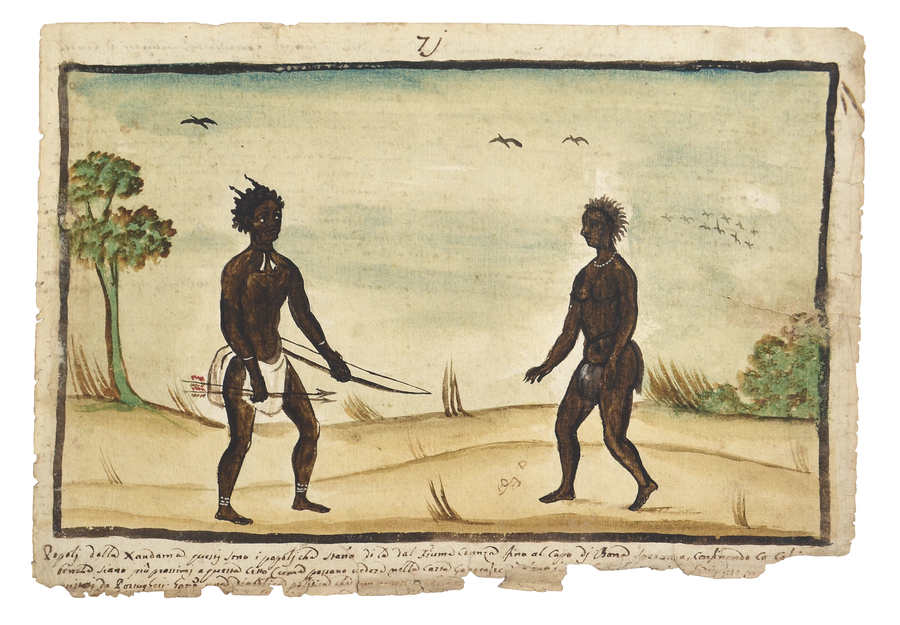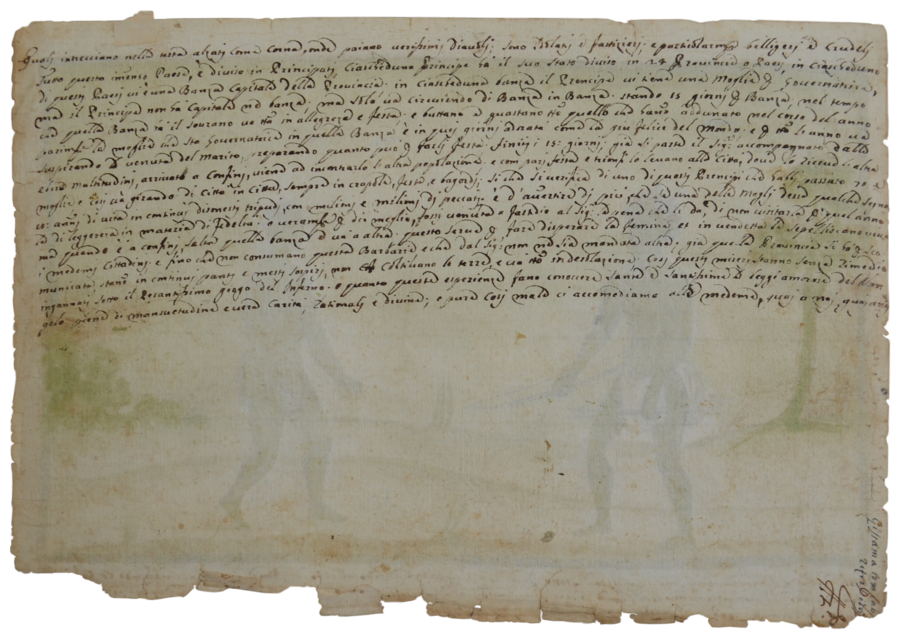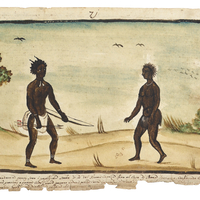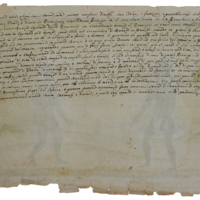PW071: People of Xandama
Popoli della Xandama1 questi sono i popoli che stan[n]o di la del Fiume Coanza fina al Capo di Bona Speranza confinando co Cal[. . .] benche siano più prossimi a questa Citta (come possono vedere nella carta geografica) [. . .] da Portughesi han[n]o una diabolica politica che non [. . .]
[verso] Quali intreciano nella testa alzati come corna, onde paiano verissimi diavoli; sono Idolatri e fattizieri; e particolarmente belligeri e crudeli Tutto questo im[m]enso Paese, è diviso in Principati, ciascheduno Principe hà il suo stato diviso in 24 Provincie o Paesi, in ciasheduno di questi Paesi vi è una Banza capitale della Provincia; in ciascheduna banza il Prencipe vi tiene una moglie p[er] governatrice, ma il Principe non ha Capitale ne banza; ma solo va circuiendo di Banza in Banza. stando 15 giorni p[er] Banza; nel tempo che quelle banza hà il sovrano va t[u]tta in alegrezza e festa; e buttano e guastano t[u]tto quello che han[n]o addunato nel corso del anno parimte la moglie che sta governatrice in quella Banza eè in quei giorni adorata come la piu felice del mondo; e p[er] t[u]tto l’anno va suspirendo la venuta del marito, preparando quanto puo p[er] farli festa; finiti i 15: giorni; gia si parte il Sig:e accompagnato dalle ebrie multitudini, arrivato a Confini, viene ad incontrarlo l’altra populazione; e com pari festa e trionfi lo levano alla Citta, dove lo riceve l’altra moglie e cosi và girando di citta in citta, sempre in crapole, feste, e bagordi; si che si verifica di uno di questi Prencipi che habbi passato 70 e 8: anni di vita in continui disonesti tripudi, con milioni e milioni di peccati; e d’av[v]ertire di più, che se una delle mogli dessa qualiche segna di legerezza in materia di fedeltà; o veramte p[er] dir meglio, fossi venuta a fastidio al Sig:e la pena che li da, e di non visitarla p[er] quel anno ma quando è a confini, salta quella banza e và a altra; questo serve p[er] fare disperare la femina; et in vendetta la sepelliscano viva i medemi cittadini; e fino che non consumano questa Barbaria e che dal Sig:e non ne sia mandata altra; gia quella Provincia si hà p[er] scomunicata, stan[n]o in continui panti e mesti sospiri non coltivano le terre, e và t[u]tto in desolazione; cosi questi miseri stanno senza rimedio ingannati sotto il Pessantissimo giago del Inferno; o quanto queste esperienze fano conoscere sante e santissime le Leggi amorose del Vangelo piene di mansuetudine e vera carità, rationali e divina; e pure cosi male ci accomodiano alle medema quai a noi, quai a voi2
[verso in Portuguese] Quissama3 com cab[. . .] refras idos [?]
People of the Xandama these are the people who are beyond the Kwanza River up to the Cape of Good Hope, bordering with C . . . [. . .] although they may be closer to that city (as they can see on the geographic map) [. . .] by the Portughese; they have a diabolical policy that [. . .]
[verso] Which they braid on the head raised as a horn so that they look like true devils; they are idolaters and fetishers;4 and particularly belligerent and cruel. All of this immense Country is divided in Principalities; each Prince has his own state divided in 24 Provinces or Lands, in each of these Lands there is a Banza5 or Capital of the Province; in each banza the Prince has a wife as governess, but the Prince does not have either capital or banza; but he only goes moving from Banza to Banza, staying 15 days in each banza; during the time that the banza hosts the sovereign, it is all rejoicing and feasting; and they throw away and waste all of that they have accumulated in the course of the year likewise the woman who is the governess in this Banza is during these days adored as the happiest [woman] in the world; and during the entire year she sighs after the visit of her husband, preparing as much as she can to celebrate him; once the 15 days are over; the Lord leaves accompanied by the drunk multitudes, once arrived at the border, the other population come to meet him; and with similar feast and triumphs take him to the City, where the other wife receives him and thus he goes around from city to city, always in binge, feasts, and revelry; so that it happened that one of these Princes who had spent 70 and 8 years of life in continuous dishonest festing, with millions and millions of sins; it should be reported in addition, that if one of the wives gave any sign of laxity in matters of fidelity; or frankly better said if she came to be a bother to the Lord, the punishment that he gives her, [would be] not to visit her that year but when he is at the border, skip this banza and go to another; this makes the woman despair and in vengeance her own citizens bury her alive; and until they do not complete this Barbarity; and that another [wife] is not sent by the Lord; this province is considered as excommunicated; they remain in permanent weeping, and sorrowful sighs, they do not cultivate the lands, and everything goes desolate; thus these poor people are without remedy, deceived under the very heavy yoke of Hell; these experiences show how Holy and very Holy the loving laws of the Gospels full of mansuetude and true charity, rational and divine are; and yet we do not make the most of them, woe to us, woe to us.
[verso in Portuguese] Quissama with [. . .]
- 1Perhaps related to the Kandama Imbangala lineage. See Joseph C. Miller, “The Imbangala and the chronology of early central African history,” The Journal of African History 13, no. 4 (1972): 554.
- 2Biblical formulae, with particular resonance in Luke 11, 42-46 or Matthew 23:13-33 “Guai a voi, farisei,” “Woe to you, Pharisees,” or Lamentations 5:16 “Guai a noi, perché abbiamo peccato!” “Woe to us, for we have sinned!”
- 3About Kisama see Aurora da Fonseca Ferreira, A Kisama em Angola do século XVI ao início do século XX, vol. 7, 8, Ciências humanas e sociais (Luanda: Kilombelombe, 2012).
- 4Here fattuzieri, which I translate as fetishers is still closer to the sense of witch than to the sense of users of fetishes, a notion that was in the process of emerging at the time see Fromont, Images on a Mission, 123-26.
- 5From Kikongo and Kimbundu mbanza: city, town. See also the unpaginated vocabulary of words from Matamba in Antonio da Gaeta and Gioia, La maravigliosa conversione.




Add new comment